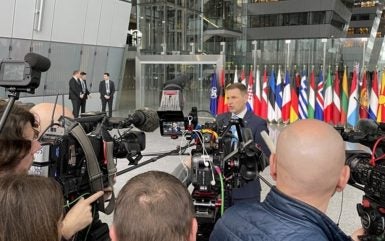
At the Ukraine Defence Contact Group (Ramstein) meeting, Estonia pledged its support by joining Latvian-led drone and Lithuanian-led demining coalitions, signalling a strategic move to enhance Ukraine’s military and humanitarian efforts.
In solidarity, Estonia’s Minister of Defence, Hanno Pevkur, affirmed the country’s dedication to reinforcing Ukraine’s defence initiatives through collaborative ventures in drone technology and demining operations. The announcement during the recent Ukraine Defence Contact Group meeting in Brussels shows Estonia’s proactive stance in assisting Ukraine amidst ongoing regional tensions.
Lithuania’s call for demining support answered
While the meeting marked the first gathering following the change of command in the Armed Forces of Ukraine, it witnessed unanimous support from defence ministers towards sustaining military aid to Ukraine. Minister Pevkur’s endorsement of Estonia’s participation in the Latvian-led drone coalition and Lithuanian-led demining coalition signifies a strategic alignment with neighbouring allies to bolster Ukraine’s capabilities on the battlefield and in humanitarian efforts.
In September, 2023, Lithuania highlighted the importance of bolstering support for its Demining Coalition despite being lower on the agenda. Minister of National Defence Arvydas Anušauskas urged undecided nations to join and contribute to the demining efforts. The coalition, formed over three months ago, comprises Denmark, Finland, Iceland, Lithuania, Norway and Sweden, focusing on a ‘train and equip’ principle to supply demining equipment and personnel training to the Ukrainian military.
“We are joining efforts within these coalitions to enhance drone capabilities in Ukraine and explore avenues for combat and humanitarian demining support,” stated Minister Pevkur, highlighting Estonia’s commitment to leveraging collective expertise for the benefit of Ukraine.
Drone technology prioritised
The outbreak of war in Ukraine saw the most widespread use of both consumer and military drone technology in a conflict to date, as outlined in GlobalData’s “Thematic Intelligence: Drones in Aerospace & Defense (2023)” report.
Amidst discussions at the Ramstein meeting, where ministers convened in person at NATO headquarters, and virtually, updates on the activities of capability coalitions were shared. Minister Pevkur provided insights into the progress of the IT Coalition, co-led by Estonia and Luxembourg, emphasizing the coalition’s growth with 11 states onboard and financial contributions exceeding €30m ($32.4m). Notably, the coalition’s Steering Group has greenlit NATO procurement agency NSPA to initiate purchases aiding Ukraine’s needs.
The IT Coalition, initiated in September 2023, aims to enhance Ukraine’s information and communication capabilities, bolstering efficiency on the battlefield. With support from member states and the recent addition of the United Kingdom’s declaration of intent to join, the coalition continues to strengthen Ukraine’s defence infrastructure.
The UK and Latvia have also launched a coalition to supply thousands of first-person view (FPV) drones to bolster Ukraine’s defence capabilities. The initiative represents a strategic shift towards prioritizing drone technology to enhance situational awareness on the battlefield.
Long-term commitment to Ukraine
Minister Pevkur reiterated the significance of 2024 as a pivotal year for the Ramstein coalition, emphasising the imperative for the US and Europe to align on long-term support strategies for Ukraine. Estonia’s commitment to allocate 0.25% of its GDP for the next four years shows a sustained effort to bolster Ukraine’s defence capabilities amidst evolving geopolitical dynamics.
The primary driver of Estonia’s large budget increase is the heightened risks and concerns over Russia following the 2022 Ukraine invasion and Russia’s continued aggressive posturing. Estonia has provided Ukraine with ongoing funding to assist them in the conflict, making this a major driver of expenditure, as per GlobalData’s “Estonia Defense Market 2023-2028” report.
Analysing the impact of collective commitments, the Estonian Ministry of Defence underscores the potential for progress in Ukraine’s defence landscape. With member states dedicating 0.25% of GDP, coupled with intensified training, enhanced production, and continued delivery of weapons systems.
In parallel discussions, the Baltic States and three NATO battlegroup framework nations convened to address regional security concerns, signalling a concerted effort to fortify stability and cooperation in the Baltic region.
Estonia’s proactive engagement in multinational coalitions reflects a shared commitment among allies to support Ukraine’s sovereignty and security, underscoring the enduring partnership between Baltic and NATO nations in navigating complex geopolitical challenges.




